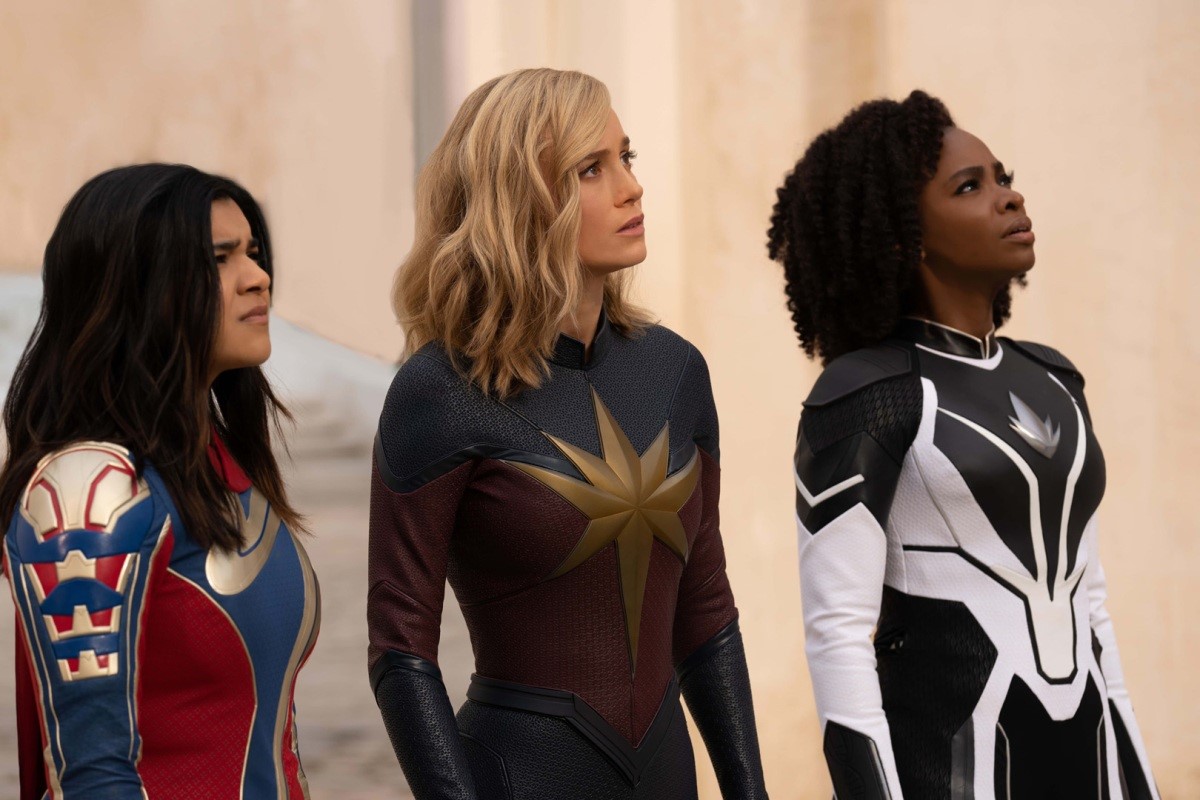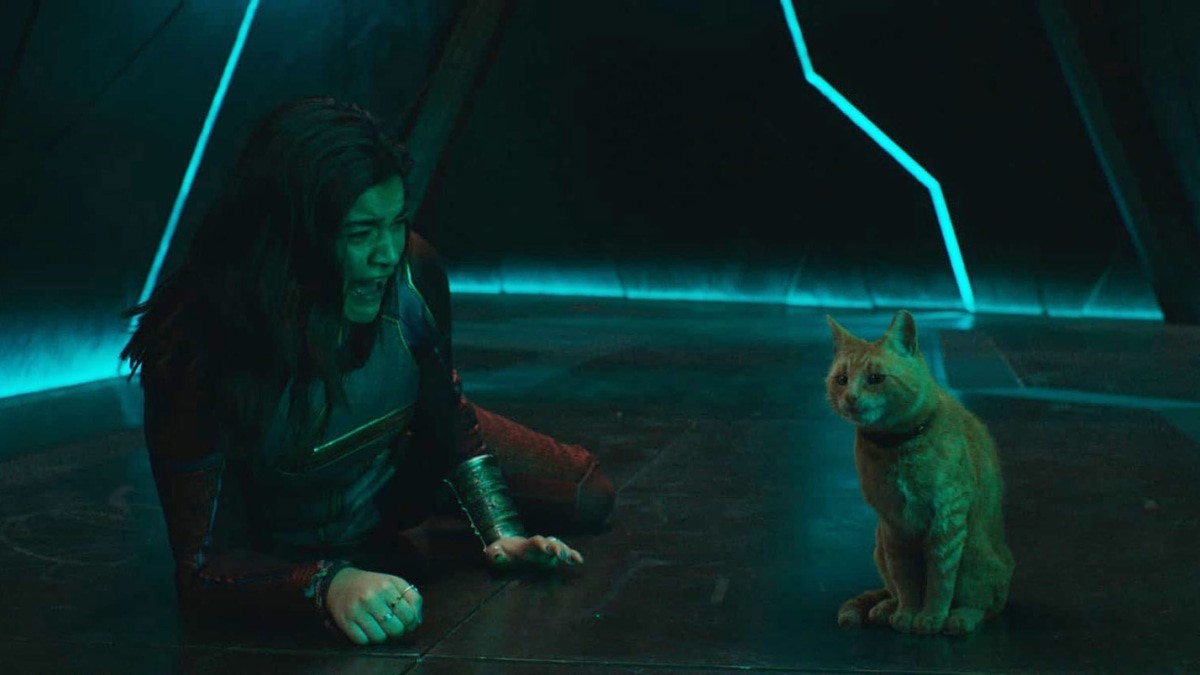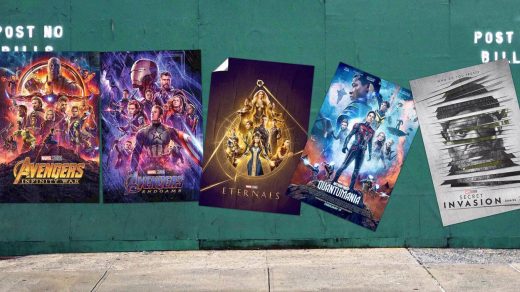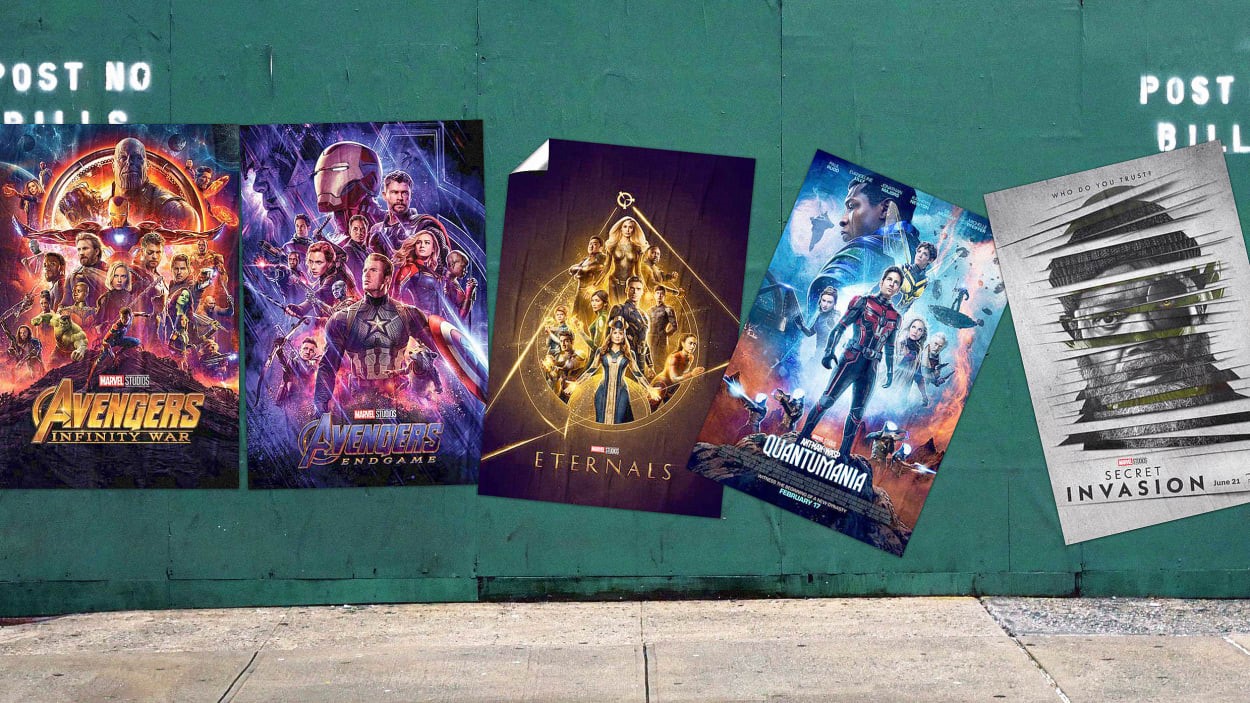Why ‘The Marvels’ can’t solve the Marvel Studios brand problem
By Jeff Beer
When Marvel Studios’s The Marvels hits theaters this weekend, it should be as close to a sure thing for global blockbuster status as any sequel ever made. But it’s not.
Its 2019 predecessor, Captain Marvel, was a massive success, selling $1 billion in tickets around the world. It ranks in the top 10 of all Marvel Studios releases, which has spanned 32 films grossing a combined $29.5 billion starting with 2008’s Iron Man. Yet, The Marvels is expected to have opening weekend sales of between $60 million to $65 million from 4,000 North American theaters, which would make it one of Marvel Studios’s lowest debuts ever.
That estimate is less about the story and stars of The Marvels, and more about the Marvel Studios brand overall, which finds itself at its weakest point since Robert Downey Jr. first donned a metal suit and sculpted goatee of Tony Stark. Ant-Man and The Wasp: Quantumnania hit theaters in February, and was billed as the first film of “Phase Five” in the Marvel Cinematic Universe. But by Marvel standards, its domestic gross of $214.5 million and $476 million in global box office was a disappointment.
Worse, the critical and fan reception ranged from lukewarm to indifference. Then in March, Jonathan Majors, who plays the film’s (and the MCU’s) lead villain Kang, was arrested and faces a domestic violence trial. For a brand accustomed to every teaser, cast announcement, and poster becoming an event, this was new territory. Guardians of the Galaxy 3 boosted hopes and box office in May, but the doubt crept back in with the underwhelming Secret Invasion show on Disney+ a month later.
“Marvel feels like it’s on the knife’s edge, right? I like to call this period the wobble,” says Joanna Robinson, coauthor of the recently-released, best-selling book MCU: The Reign of Marvel Studios. “They’re still making so much money, but there is a tarnish on the brand.”
In the book, Disney CEO Bob Iger is quoted talking about the power of the Marvel Studios brand, and how it built a trust among fans that, even if you’d never heard of a certain character, the Marvel logo in front of it would guarantee a certain level of quality.
“Now that we’ve seen Secret Invasion and The Eternals, just because it says Marvel Studios in front of it doesn’t mean it’s as solid as that incredible run they had through Avengers: Endgame,” says Robinson. “Their biggest weakness is that diminished brand, but the greatest strength is that brand that existed in the first place and the loyalty and emotional connection that people feel to certain characters.”
I spoke to Robinson and coauthor Dave Gonzales, who wrote MCU along with Gavin Edwards, for Fast Company’s Most Innovative Companies podcast.
The MCU may be at its weakest point, but Robinson is quick to say how relative that is to the strength it’s built up over the years. “Dave likes to bring this up all the time, so I’ll happily steal his point for him,” she says. “They haven’t made a movie with Avengers in the title since Endgame. They still have some kind of deal with Sony around Tom Holland as Spider-Man, and people will absolutely show up for those movies. They also have the Fantastic Four and the X-Men waiting in the wings. So I think it’s foolish to count them entirely out. But I think they know that they need to sort of focus on that because they don’t have any free passes left.”

Origin Story
So, how did we as fans and Marvel Studios get here? That journey is expertly chronicled by Robinson, Gonzales, and Edwards, who take readers through the unprecedented rise of pop culture’s very own multiverse of madness. This deeply-reported tale takes us from Marvel selling off its characters to other studios for bargain basement prices, to Kevin Feige’s start in blockbuster superhero films working for director and producers Richard Donner and Lauren Shuler Donner, all the way up to how Marvel and its increasingly connected stories essentially swallowed Hollywood.
It’s not just a Marvel Studios story, but a crucial and unique period of film history.
“We care about comic books and superhero movies, but we also care about the long tail of this as a Hollywood story,” says Robinson. “What is the Marvel method? One of the answers is that they lifted things from the old studio system in Hollywood, in terms of locking down actors for long contracts, bringing writers in house or bringing artists in house, and all this sort of stuff.”
Gonzales points out that Feige and the studio also used its films to teach fans how to enjoy and anticipate what was coming next. “The fact that we went from 2008’s Iron Man, and then at the end of Endgame, everybody knew who Thanos was and what the Infinity Stones were, is an insane instance of a brand not only doing good movie storytelling, but teaching you how to be loyal to the brand,” says Gonzales. “And it’s something they’re struggling with a little bit now.”
As the Marvel Studios brand exploded, it quickly turned anything even remotely associated with it into gold, with TV shows anchoring the launch of the Disney+ streaming service, films regularly topping $1 billion or close, as well as spawning an entire ecosystem of unofficial podcasts and YouTube channels dedicated to discussing its every move.
But as with many brands that burn that bright, over time they often begin to fade under the pressure of consistency and constant growth. Marvel is no exception.
As MCU details, the proliferation of films and TV series put an unprecedented strain on the model Marvel had perfected, as well as the man tasked with steering the ship.
“If you tell Marvel they have to release three movies and four TV series every year, that all still has to bounce through Kevin Feige’s alchemy machine, because there hasn’t been anybody else, at least according to Disney, that can do that,” says Gonzales.
It appears Disney does recognize that there needs to be a return to focus on quality over quantity. “Bob Iger himself has said that if we slow down, then everything feels more special,” says Robinson. “Then things don’t feel as disposable, and you’re more inclined to go invest deeper in it because it doesn’t feel like, ‘Okay, I’m just back on the wheel again for the next show.’”

Branded Multiverse
There are signs that Marvel is experimenting with its brand in new ways. This past week, the studio launched the first trailer for its new series Echo, under the Marvel Spotlight banner. Spotlight is based on a classic Marvel Comics anthology series launched in 1971, but today will signify stories that don’t directly tie in to the broader MCU storylines. It’s basically a way for Disney to tell people that they don’t have to watch 12 other movies and TV series to know what’s going on in its latest release. Brad Winderbaum, the studio’s head of streaming, television, and animation, told Marvel.com, “Marvel Spotlight gives us a platform to bring more grounded, character-driven stories to the screen, and in the case of Echo, focusing on street-level stakes over larger MCU continuity.”
“Marvel has heard people call it homework,” says Robinson, “and they’re like, ‘Okay, we just signal to them that they can watch these things without having watched everything else.’”
Gonzales says that the original Spotlight comic anthology series came about because publishers realized that new readers were hesitant to jump into a comic that was hundreds of issues into its story. That’s a familiar challenge now with so many films and series, but it is worth noting that the comic book Spotlights were written with that intention from the start, while Echo has become a Spotlight after the fact. “Echo has become a Marvel spotlight that features Kingpin and Daredevil,” says Gonzales, referencing characters from another upcoming series, Daredevil: Born Again. “So I’m interested to see how they make do with that brand, if this is how they do it. [I wonder] if going forward, there’ll be things that are projects that are written specifically to be Marvel Spotlights.”
By the time you’re reading this, chances are there is already a news cycle in motion around the opening weekend box-office performance of The Marvels. Gonzales makes a compelling point about the connection between Marvel Studios’s current brand wobble and broader trends in theater-going movie fans.
“Basically, the only thing that’s been hitting this year in terms of box office has been some sort of virality: Barbenheimer, or going to Taylor Swift with your friends. Teenagers are going to Five Nights at Freddy’s. Those are the things generating hits at box offices. This feels like another Marvel movie, another entry in the [MCU].”
Why rush out to see The Marvels in theaters when it’s going to be on Disney+ before there’s another Marvel movie that comes out? The studio even dropped an updated trailer, directly tying the film back to popular heroes like Iron Man and Captain America, in order to stoke some ticket-selling excitement.
Gonzales says it’s a huge uphill climb for any Marvel film. “One of the reasons that Guardians 3 did so well is it was a rare Marvel movie that got to market itself as an ending, like Endgame,” he says. “So, people were motivated to go see it in theaters. All the other Marvel entries have been, ‘Here’s the next chapter in Marvel.’ What that means is you don’t necessarily have to see it now. So, I think a lot of the sheen of going to see the new Marvel movie the weekend it comes out is gone, both because of what the brand has done to itself and because of what movies are currently going through.”
Yet, to Robinson’s earlier point, Marvel does still have so much going for it. Every superhero story needs a seemingly insurmountable obstacle, right?
“They’ve just lost some of that automatic buy-in from people,” says Robinson. “I hope they come back. Because when Marvel’s good, it’s great, and I don’t mean to hang crepe for them. It’s not all doom and gloom.”
(29)



